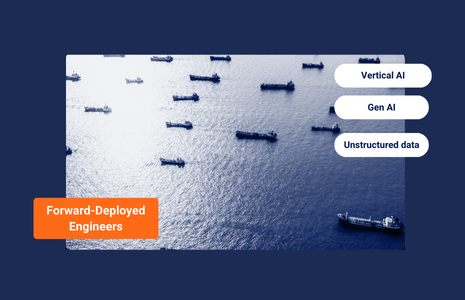Introducing Windward’s Data for Decarbonization Program

What’s inside?
World trade is nearly 32 times greater now than it was in 1950. Today, $14 trillion is spent each year on transportation globally – over 90% of which is by sea. And while there has been incredible innovation in the global transportation of goods, there is still a gap in how technology is used to make maritime trade more sustainable. The global nature of maritime makes it a heavily regulated industry, and this alone creates a unique challenge. The expectation is no less than: reverse engineer your supply chain, find the leaks, and improve.
Nevertheless, the industry has reacted surprisingly well to the challenges of this. The shipping industry switched to lower sulfur bunker fuels in Q1 of 2021, almost without missing a heartbeat. But reaching net-zero is a whole new playing field.
A problem worth solving
The path towards decarbonization is a long one. In order to reduce emissions, the industry needs new, cleaner fuels and vessels. Neither will be immediate returns. But, until then, the industry can’t sit idly by. Optimizing the operational factor of vessels can start today, and AI is the perfect fit for this task. However, developing an accurate solution will only be successful if boosted by the power of a strong network of data and thought leaders. This collaboration will be essential in the evolution of commercial processes that benefit curbing global emissions. Why? No one company has enough data to model fuel consumption and carbon emissions across the world fleet. And even if they did – changing global commercial processes shouldn’t happen alone – it involves us all and should therefore be a global initiative.
Why we need you
As opposed to other challenges for business, where each company can excel on its own, with climate – no one can succeed alone. Meaningful change will come in moving from an all-too-familiar siloed framework to active cooperation.
The answer lies in the power of many. Those that invest in sharing data and insights are likely to enjoy the advantage of a more precise and accurate model – explicitly trained on a large dataset that accounts for your unique operations. Nobody knows your business better than you. So you should benefit from a solution that has your insights.
Why Windward?
The shipping industry is highly susceptible to segmentation, and since day one, Windward has worked to integrate maritime big data sets to provide actionable insights for the benefit of the shipping industry. The only way to scale innovation is by solving a dynamic problem with a dynamic approach. And thanks to the power of data, we can get there. Windward was founded in 2010 to solve the problem of data visibility in the maritime domain. Over the past ten years, the potential applications of maritime visibility have expanded far beyond security and intelligence.
In 2020, the OFAC and OFSI advisories were, in essence, a revelation of what stakeholders should be aware of. However, they didn’t provide guidelines or define the framework for a risk-based approach. The good news is that today the right data and AI-based tools are empowering decision-makers to create the best business outcome. This very technology has been the driving force behind some of the world’s largest marine insurance companies’ pricing models. We believe we can do the same for decarbonization.
Windward’s Data for Decarbonization Program
We are proud to announce Windward’s Data for Decarbonization Program, a collaboration opportunity for like-minded shipping industry participants who want to:
- Understand their own data in detail, in the context of the industry
- Foster a collaboration between in-house IT, ESG, and commercial teams and the best data science experts in the industry
- Voice their unique processes and needs in an industry-wide solution
- Leverage best-in-class AI models and data to move beyond a zero-sum game
- Influence product features and capabilities

A solution for everyone
When it comes to carbon emissions, many players in the ecosystem are in the dark because while they may have data, they don’t have the tools to aggregate it in the context of the industry as a whole. Machine learning has the power to leverage big data at scale so you can get a more holistic view of emission performance and how it impacts your operations:
- Shipowners: For shipowners, this means answering critical questions like: How is my fleet ranked to other comparable fleets in regards to carbon emissions performance? How can I optimize my fleet to reduce fuel consumption without installing costly equipment on vessels? Yes, many vessels today are equipped with IoT devices capturing data from vessels, but this requires investment in hardware installation and its maintenance, continual data collection, and consumes additional time of already busy seafarers at sea. And just as importantly, some of the parameters are not easily measured – for example, the causal areas of hull fouling or global weather patterns and sea conditions.
- Charterers: Historically, the decision to select a vessel to ship cargo from A to B rarely includes a detailed consideration of the emissions associated with the voyage. We recognize there is a desire for this to change – this collaboration provides the perfect opportunity. What if you could accurately predict future emissions in the run-up to confirming the charterparty and make that an integral part of the contracting process? You could then plan and optimize your voyages to include carbon emissions considerations.
- Freight forwarders and beneficial cargo owners: How do you respond to shippers and consumers increasingly demanding the transparency of carbon from the point of source to the point of sale? For this to happen, you need to demonstrate carbon shipping performance for every container box. This will require considering the projected route for every shipment, no matter what liner it is shipped on. Only then can every shipper and freight forwarder begin to analyze, predict, and price their carbon footprint.
- Trade finance teams: Emissions data is not easily available to integrate into financing screening processes in an efficient or automated way. How can you support financing decisions that influence the move to a lower-carbon future without emissions data in a visible and workable format? How can you independently verify the maritime environmental impact of financing decisions?
- Government agencies: If one nation reduces its carbon emissions by 50% and the rest of the world doesn’t – the impact still won’t be enough. Each country must play a role in how data is used to improve decarbonization efforts. By monitoring the vessels that enter national waters with accurate and actionable data, nations can not only better manage emissions but provide incentives, like in the form of port dues, for less polluting vessels.
Join us
The impact of a solution that can answer these questions will benefit each player’s business and carbon initiatives. As we move forward into this new chapter, Windward will, as always, strive to be your most trusted partner. We’re so excited about what we can accomplish together. Get first access to Windward’s Data for Decarbonization Program to start your carbon efficient journey today.










